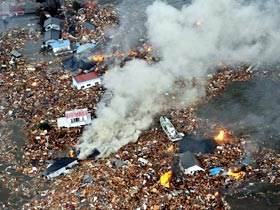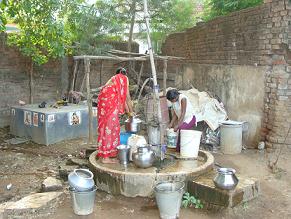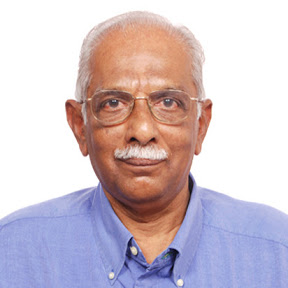- Details
- Written by Mathew Thomas
- Hits: 19899
Nuclear Power Plant Debate

A debate on nuclear power plants and their safety was discussed on a TV channel. Three scientists and a civic activist were on the panel. One panel member, a former head of the Atomic Energy Commission said that our plants have been in service for 42 years!
The IAEA first stipulated 20 years as the useful life of a nuclear plant. After this, nuke plants are to be shut down and covered in concrete silos to prevent radiation. Later IAEA, perhaps under intense lobbying by the nuke industry, arbitrarily increased the life of nuclear power plants to 40 years.
Our plants have been in operation for more than the allowed, extended life permissible under international regulations. Yet, our "experts" proudly proclaim this as virtue.
Now, a news report indicates that the former president would be asked by the Government to convince the people living near Koondankulam nuclear plant about its safety. Kalam is not a nuclear scientist. Why does the Government want to use him for this purpose? Are they playing on his media image and the ignorance of people? This is nothing but the worst form of deceit a government could play on its people.
- Details
- Written by Mathew Thomas
- Hits: 6884
WHAT POVERTY SOLUTIONS MISS
The Planning Commission recently stated in an affidavit before the Supreme Court that BPL criteria could be incomes of Rs. 32 or 25 per day per person, in urban and rural areas respectively. The furore created by this rather injudicious statement led to both a backtracking by the government and a spate of poverty solutions by experts and civil society organisations. An article titled, “What the poverty debate misses” by Kirit S Parikh, in ‘The Times of India’ datelined 4 Oct 2011, illustrates the kind of muddled thinking that characterizes many of the poverty solutions touted out in public space. Reading the article, one does not know whether the author is advocating the UID project, branded as, Aadhaar, or whether he is suggesting a solution for providing subsidised food grains to those below a defined poverty yardstick. Seven times the author mentions Aadhaar, of which, five times he talks of Aadhaar Card. Could it be that he is not aware that Aadhaar is NOT a ‘card’, but merely a number in a database? Media often mentions ‘Aadhaar card’, when the chairperson of UIDAI [Unique Identification Authority of India] has repeatedly clarified that, there is no such card. Yet, why is this misconception propagated? The article first proposes use of smart cards or food coupons. It then points to the “messy problem” of printing the coupons and distributing them to the poor. The author sees the UID number as a solution to printing and issuing coupons. Perhaps, he is ignorant of the “messy problem” of capturing the biometrics of the poor and authenticating them at the PDS food distribution shops. However, he readily admits that even with the “Aadhaar cards”, the task of identifying the poor remains. The learned researcher accepts, “Large exclusion and inclusion errors of the present system of issuing BPL cards will still persist”. He suggests universal right to food as a means of overcoming exclusion errors. He further suggests that instead of identifying the poor, excluding the “easily identifiable rich”, making PDS universal. The flip-flop of confusion continues as the article proposes “self selection”, in the universal PDS scheme, by households purchasing rations with an Aadhaar card. Does the author assume that the “easily identifiable rich” would not have an Aadhaar card, if indeed such card were to exist sometime in future? Next, the author, says, “the problem of diversion (of PDS food) can be taken care of by providing food coupons or Aadhaar card linked entitlements that can be purchased at any shop.” One cannot but help noticing the contradiction a few sentences earlier, when the “messy problem” of printing coupons was decried. He goes on to advocate “co-operatives” in remote areas as a way of combating traders who would overcharge in the above “any shop” scheme. Why should the cooperatives be confined to remote areas? A few paragraphs later, the author suggests cash-transfers through Aadhaar cards. He concludes that 200 million poor households could be provided Rs. 4,500 per year through cash transfers, keeping Rs. 4000 Crores for “administering cash transfers”. He fails to notice that the administrative cost is nearly 50 % of the total cost! This seems to be the conclusion of the article; cash transfers to 200 million poor households through UID. In arriving at the conclusion has he forgotten the misgivings he expressed regarding the problem of identifying the poor. One is reminded of the children’s fable of catching the crow by placing ghee on its head and waiting for it to melt and blind the bird! The author’s circular reasoning begs the question.

These apparently scholarly solutions miss the basic causes for poverty and ways to lift people out of it. Hence, the solutions concentrate on identifying the poor, uniquely, numbering them and locating them. This is not because solutions are unavailable. It is due to the refusal to accept available solutions. Galbraith calls this “innocent fraud”. He explains, “There is always popular error. What prevails in real life is not the reality, but the current fashion and pecuniary interest”; “this fraud derives from traditional economics and its teaching.”
A simple poverty-alleviation solution has two dimensions. One is to provide immediate sustenance to the needy. The other is to adopt and implement economic policies that would eradicate poverty.
The first is quite easy. Universalize PDS, install effective accounting, facilitate cooperatives (unfettered by political parties), prevent damage to food stocks, distribute them and impose stringent penalties for corruption. This eliminates the costs of identification and the corruption accompanying it.
The solution to the second dimension lies in Schumacher’s thesis. He says, “Development does not start with goods; it starts with people and their education, organisation and discipline”. “Alleviation of poverty depends the removal of deficiencies in education, organisation and discipline.” Schemes like MGNREGS are counter-productive. They condemn people to life-long labour, with no hope of exit. The effort should be to provide education and skills that are relevant, to the needs of, and usable in, the places where people live. This would prevent rural unemployment that produces mass-migration into cities. It is impossible to handle such exodus of immense proportions. The wasted resources of the JN-NURM project should be a lesson. If not, rural unemployment becomes urban unemployment. The task is to create millions of workplaces in rural areas and small towns with appropriate technology and education / skill impartation. For this, resources could be found from diverting funds now locked in wasteful effort in big cities. As Schumacher says, “It is necessary, that at least an important part of the development should by-pass the big cities and be directly concerned with the creation of an agro-industrial structure in rural and small-town areas.” The current attempt to impart city skills to rural population, like making them capable of employment in BPOs, is foolish.
Organisation could be provided through people’s cooperatives, where politicians and political parties or governments have no administrative role. Discipline would come from within the cooperatives themselves. The requirement is for change of mindset from fashionably current western economic thinking to realistic, indigenous economic solutions. This is indeed difficult when the economic policy is formulated by those schooled in traditional failed policies of World Bank and IMF.
- Details
- Written by Mathew Thomas
- Hits: 5802
Subsidy, Unique Identity and You - The LPG Subsidy Leakage Conundrum
The Economic Times, Bangalore on 6 July 2011, carried a headline, which is the title of this article. UIDAI and the Government have appear to have assumed that duplicate identities are used to siphon away subsidies. The Karnataka State Government has been active in a quixotic exercise to eliminate LPG subsidies. Consumers were asked to provide electric meter numbers, called RR numbers. This interesting because LPG consumers already have a number - the consumer number - to identify them. LPG cylinders are delivered at the residence of the consumers. The logic of how another number would eliminate what is termed "illegal connection", is absurd. The Government, as usual, has not made public their logic.
For eliminating LPG subsidy leaks, is it necessary to link consumers to numbers or other forms of identification? Inherent in this line of reasoning, is the silly assumption that consumers are those who are responsible for siphoning the subsidies. It would be a simple matter to investigate where the and how the leak is taking place. Why has this not been done? Why proceed on assumptions?
Would it not be possible to simply check the consumption pattern to see who swiping the subsidies? After all, a normal household would consume less than a cylinder in a month. Any monthly consumption of several cylinders should be treated as suspicious and investigated. Would it not be simple to do so? "Elementary, My dear Watson", Sherlock would have remarked.
Why is this not being done? When common sense is discarded, by UIDAI and the governments at the Center and State, one needs to look behind the smokescreens. As the smoke is cleared, one would see that UIDAI and these governments have some other agenda, other than preventing leakages. What this agenda is, is the million dollar question.
- Details
- Written by Mathew Thomas
- Hits: 5184
Admittedly, India's energy needs are immense. It is essential for economic growth. The PM staked his government's survival on the "1 2 3 agreement" with USA. This was hailed as epoch-making, leading to solution to our energy requirements. The Congress heir-apparent was seen making an emotional pitch in Parliament during the discussions on the Bill. He rhetorically referred to Kalavati, a poor woman, as one who would benefit from the outcomes of the Bill. The Parliament debate saw the "Cash-for-votes" conundrum. This sorry episode, one of the saddest in our Parliamentary history, was in the news as a fall out of WikiLeaks. It is difficult to believe that the PM and his party managers were unaware of the attempt to purchase MP votes. The Government soft-pedalled on the recommendation of the JPC, which inquired into the scandal, that further investigation is to be done. Why would the US ambassador tell lies to his bosses in Washington in a cable? The US Government has not denied the cable’s contents. Whatever be the truth, the PM’s keenness to push through the Bill stands out clearly. Did the Government examine all the implications of rushing into nuclear power as the solution for the nation’s energy? Did the Government examine alternatives? If so, what were the conclusions? If not, why did the Government and the PM fail to do so, in so important a measure?
One cannot help the uneasy feeling that nuclear lobbies in USA were behind the push of the Indian Government for the deal. The PM called Bush, as India’s best friend! Bush has the distinction of being the most unpopular president, ever, in the history of the United States.
The disaster in Japan has woken the nation to the pitfalls of the nuclear energy option into which we were rushed, by the PM’s blind faith in this solution. Even now, the attempt seems to be gloss over the issues and use make statements to assuage people’s anxiety. Opposition is brewing to the plant on the Maharashtra coast. It is being dealt with through use of police force.
Now, we have a group of eminent citizens, including a scientist, an economist and a historian asking the Government for re-examination of the option. Follow the link to the NDTV news story. It would be interesting to see the PM’s reaction. Would he, like a ventriloquist’s dummy, maintain a stoic silence, as is his usual stance, until forced to come clean?
India has immense resources in solar, wind, tidal and geo-thermal renewable energy. Would it not make sense to spend on these rather than go in for nuclear energy, which is neither cheap nor safe, unless of course, the purpose is to use the Indian taxpayer to bail out the US nuclear business?
- Details
- Written by Mathew Thomas
- Hits: 4143
USA and UPA
There is just one letter that separates the abbreviations of the governments of USA and the Indian government. Now, Wikileaks shows that even this difference is notional. That our current PM was a preferred nominee of the IMF to be the finance minister in the Narasimha Rao government, when the country went to that financial institution with a begging bowl for foreign exchange, is well known. With a carefully cultivated media image of honesty, the PM had thus far kept himself above suspicion. Not any longer, what with all the scandals swirling around him today.
USA and its Nuke lobby are the ones that have the maximum to gain in the nuke deal, the so-called, ‘1 2 3 Agreement’, is not in doubt. Not being able to sell their designs, technology and equipment for nuke power plants, India is as good a dumping ground as any. The PM staked the survival of his previous government on the passage of the nuke bill. Did he really believe that nuke power is so crucial for India that he would let the government fall if the bill did not go through? India has plenty of alternative sources of renewable energy in solar, wind, tidal and ocean thermal energy. Why is it that the PM pitching for nuke power, which is neither cheap nor free of pollution?
One in four MPs has a criminal record. It is not difficult to give credence to news that they took bribes. USA and its machinations to sabotage elected governments all over the world have been exposed by Wikileaks. No wonder then, that USA is keen to get hold of Julian Assange. The inhuman treatment meted out to Wikileaks collaborator, US private, Manning, is clear indication of the extent to which that country would go to maintain its fig leaf cover, as paragon of virtue in the arena of human rights.
The PM has been promoting UID vigorously. He has not even cared to reply to the letter written to him by the MP, Rama Jois, raising several serious concerns of national security and democratic propriety, in having US companies involved in UID and spending money on the project without Parliament sanction.
It is time the nation woke up to the reality of the degradation of governance and democratic norms. It is time to raise our voice against toeing the UD line and virtually selling the country’s interests at the alter of the economic philosophy that the PM subscribes to.
Read the full story of the ‘cash-for-votes’ scandal as revealed in Wikileaks as reported by ‘Headlines Today’.














